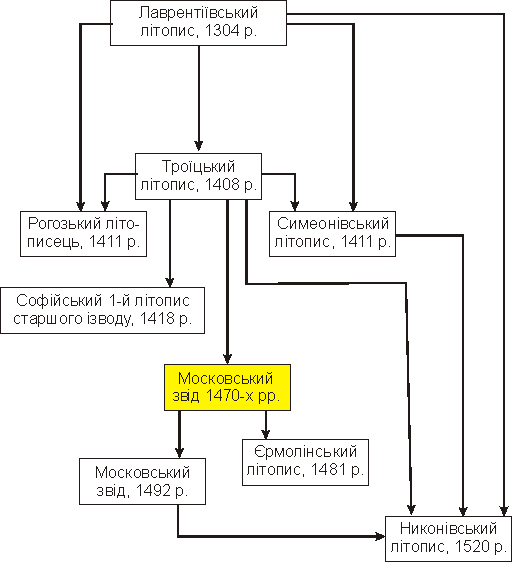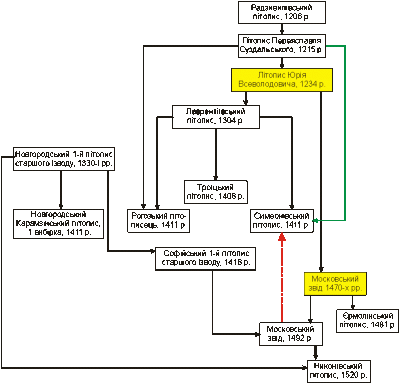Analysis of sources
Nicholas Zharkikh
Shortened text of the section. Full text in ukrainian version.
The messages listed in the table can be considered authentic, coming from ancient sources, relatively (as far as possible) close to the time of the events themselves. Of course, this does not mean that they are all competent and truthful. Before using them, we must consider their source value.
We see that the late chronicles (beginning of the 15th century and later) mainly retell the messages of the early chronicles, sometimes shortening them and introducing some mechanical and substantive errors (they are noted in the cited texts and sometimes in the table).
Stemma news about Chernihiv 13th century
Hypothetical protographs: "Chronicle of Yury Vsevolodovych" and "Moscow codex of the 1470s" are highlighted with a yellow background. They are protographs of EL and MZ1492. The existence of these protographs is practically indisputable.

Stemma news about Boris and Gleb Vasylkovichs
When considering these stemmas, it should be remembered: they do not reflect all the textual connections between the chronicles, but only the connections within the framework of the extracts I made.
Chronology of chronicle records also cause a lot of trouble for researchers.
All the news we collected are very clearly divided into two groups:
– first group refers to Chernihiv and Chernihiv princes in 1198-1246;
– second group concerns Rostov princes Boris and Gleb Vasylkovichs (grandsons of prince Michael Vsevolodovich) in 1231-1278.
In the second group, there is no mention of Chernihiv, and the question may arise – why are they needed in this work at all? – It was necessary to find out whether the Chernihiv roots of the Rostov princes influenced their actions (it turned out that it did not).
We have 176 (one hundred and seventy-six) reports about Chernihiv and Chernihiv princes for the years 1198-1246, and 2 (two) for the years 1247-1370 (conditionally). And at the same time, we cannot complain that key sources are interrupted in 1246 – no, all our Rus’ sources continue to record further events, only Chernihiv no longer appears in them.
The flow of news about Chernihiv is interrupted not due to a break in the sources, but due to the disappearance of the subject itself – the Chernihiv principality as a component of the ancient Rus’ political system.
This is the main result of our review:
1. The Chernihiv principality was destroyed by the Tatars in 1239-1246 and was never revived again..
2. All conversations about "Chernihiv princes of the Tatar era" belong to mythology.
3. The destruction of Chernihiv as a political unit caused the disappearance of all Chernihiv literature of the Old Rus’ period, including chronicles (assuming its existence).

